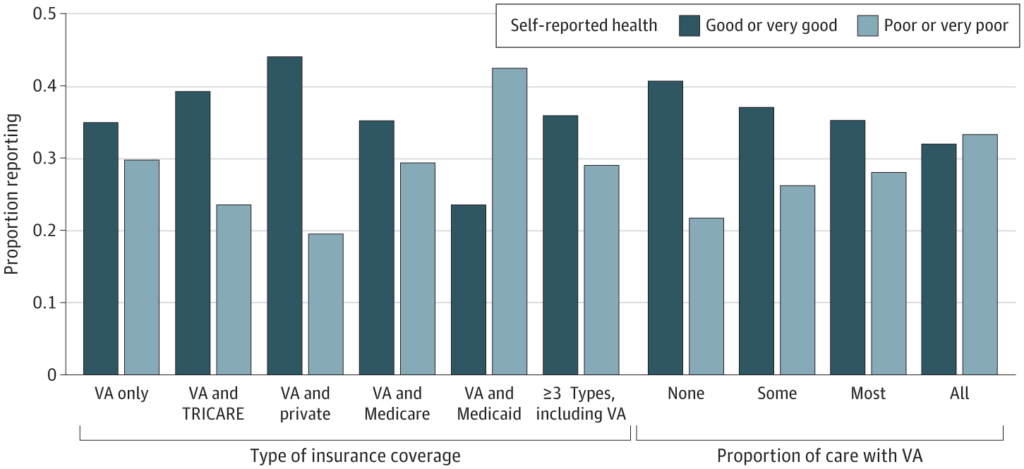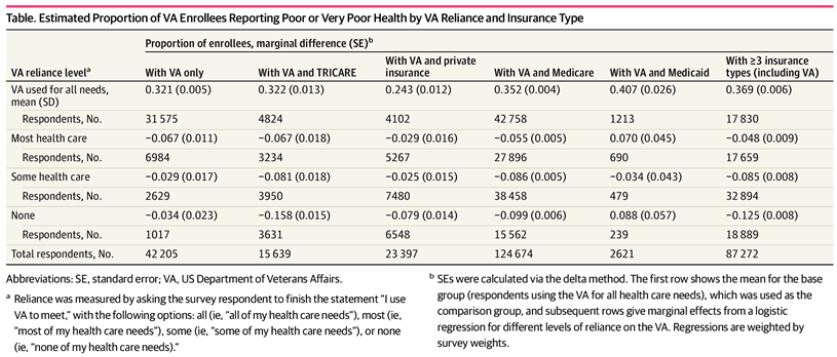
Click to Enlarge: Self-Reported Health by Insurance Coverage and Proportion of Care Through the VA, VA indicates US Department of Veterans Affairs. Source: JAMA Network Open
PALO ALTO, CA — The largest integrated healthcare system in the U.S., the VHA serves more than 9 million veterans enrolled in the VA healthcare program. Yet not all veterans rely on the VA exclusively for healthcare. Approximately 80% have at least one other form of health insurance—whether Tricare, Medicare, Medicaid or private insurance.
The selective use of healthcare by these veterans creates challenges for VA leadership in analyzing VA-provided and VA-purchased care. “These analyses will be inaccurate if patient health and reliance on the VA are linked, especially as the VA expands its role as a payer of care and the recently passed PACT Act brings in younger veterans, who are more likely to have private health insurance,” wrote the authors of a new study examining the relationship between veterans’ insurance use and self-reported care.
The cross-sectional study, published in JAMA Network Open, used data from the 2015 to 2021 VA Survey of Enrollees, a survey conducted annually with approximately 50,000 enrolled veterans to provide critical and essential information and veteran utilization of health service. The survey asks about health insurance status, reliance on the VA for health care (“none,” “some,” “most,” or “all” health care), and self-reported health on a scale of 1 (very poor) to 5 (very good).1
The researchers from the VA Palo Alto Health Care System and colleagues examined self-reported health by insurance status and self-reported VA reliance. They used logistic regression to calculate the proportion of respondents reporting poor or very poor health by level of reliance on the VA within different insurance types and weighted analyses using sampling weights designed to make the sample representative of enrollees in a given survey year.
Their analyses found insurance status was associated with large differences in self-reported health. VA enrollees with private coverage were the most likely (44.0%) and enrollees with Medicaid were the least likely (23.7%) to report being in good health. VA reliance was also associated with self-reported health. Veterans who received all care through the VA were the most likely to report poor health (33.3%), whereas 21.2% of veterans who received no VA care reported poor health.
Veterans Using Outside Care in Better Health

Click to Enlarge: Estimated Proportion of VA Enrollees Reporting Poor or Very Poor Health by VA Reliance and Insurance Type Source: JAMA Network Open
“From our data we found that people who don’t use VA report having better health,” said Liam Rose, PhD, a health economist with the Health Economics Resource Center, VA Palo Alto Healthcare System and first author of the study. “The more you use VA, the less likely you are to say you are in good or very good health.”
The adjusted analysis within insurance type showed similar findings, Rose said. Apart from respondents with Medicaid and VA care only, individuals who reported no care with the VA were less likely to report poor health. Respondents with the VA and Medicare made up the largest group (124,674 respondents), among whom respondents with no VA reliance were 9.9 percentage points less likely to report poor health than those who used the VA for all health care needs.
While the study shows a relationship between VA use and self-reported health, it does not—nor was it designed to—explain why VA users may have poorer health. Nor does it explain why some veterans rely more or less on the VA.
“I think it is important that this study is not looking at the drivers of why they are using more or less, just that this relationship exists,” Rose said. “There could be many things that drive VA reliance. It could be where people live—VAs are spread out, and sometimes you don’t live close to one. It could be that people are unable to access all of the services it has to offer because it is full, or maybe they don’t trust the VA, or maybe they have better health-care outside the VA. These are all possibilities we were not able to look at.” The drivers of VA reliance should be investigated in further research, the authors stated.
“I would say the main finding for us is that it is difficult to measure population health among enrollees, and the reason for that is that people who do not use VA or use VA seldom are different from those who use VA all the time,” Rose said.
“This [difficulty] directly affects the VA’s stated goals of ensuring adequate access to care, preventing suicides, and supporting veterans’ whole health, given that it remains unknown if resources allocated to improve access are targeting individuals in need or providing additional options to those in better health and with better outside insurance,” Rose and his colleagues wrote.
These results also underscore the complexities of providing care, measuring quality, and forecasting needs in healthcare systems, an increasingly common issue with the increase in hospital-based health systems, the authors stated. “The findings should push the VA to consider outside access and use for new enrollees.”
- Rose L, Schmidt A, Gehlert E, Graham LA, Aouad M, Wagner TH. Association Between Self-Reported Health and Reliance on Veterans Affairs for Health Care Among Veterans Affairs Enrollees. JAMA Netw Open. 2023 Jul 3;6(7):e2323884. doi: 10.1001/jamanetworkopen.2023.23884. PMID: 37459100; PMCID: PMC10352854.

